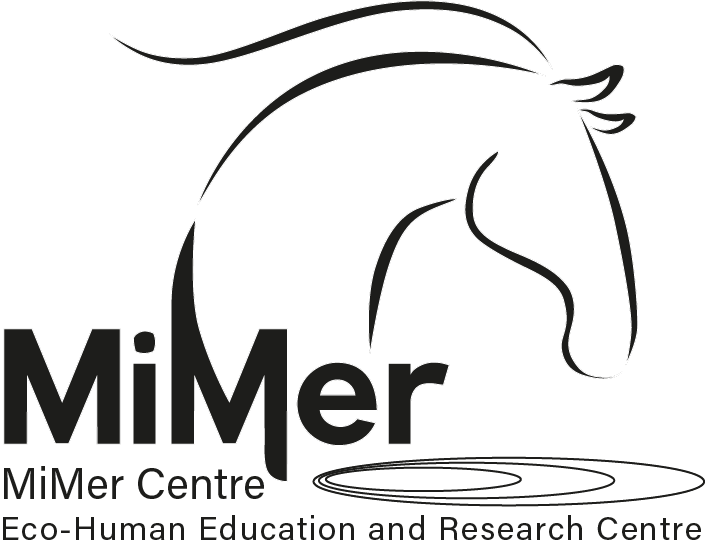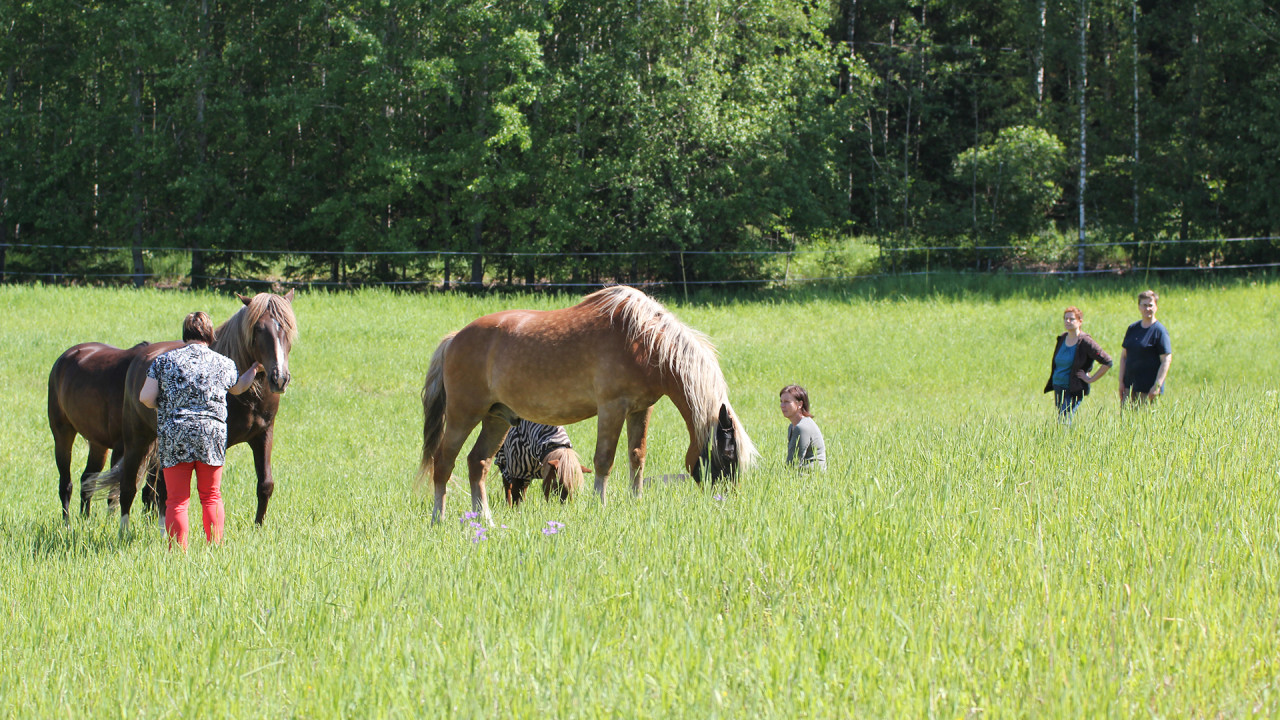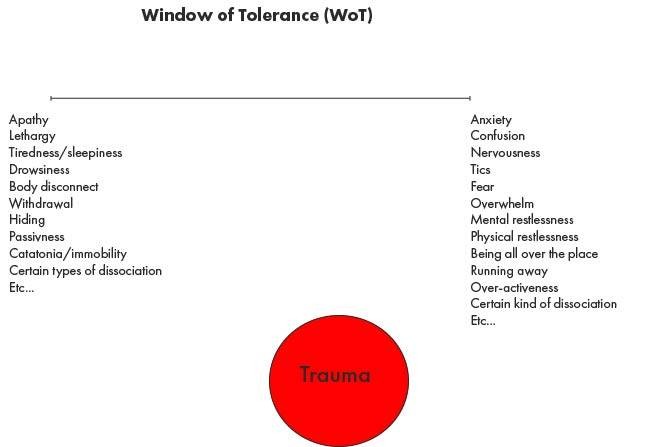Everything hard or stressful is not trauma…
The difference between trauma and stress and the difference between trauma in humans and "trauma" in non-humans
The picture below shows the window of tolerance (and window of learning). This is the window in you that needs to be open enough for you to learn something new. It demands the factors – openness and tolerance to new information (but potentially also new situations, new environments, new beings (humans, non-humans) to relate to).
When you move too far to the left side in this picture (or bottom if you turn the picture around – a window has 4 frames…), you will gradually defend yourself against new learning by shutting (down) the window. If you move too far to the right (or top of the frame) – you are opening (it) up too much, you are taking in in too much (information, stimuli, experiences, emotions…) and get overwhelmed.
For you to learn – you need to stay in your window of tolerance, keep it open. When something is stressing you (one or more stressors are entering the picture), you will move closer to the edges in your window of tolerance. And being close to either of the edges heightens your ability to learn (moving out of complacency). You are challenged. And you need to make use of your potential and your learning resources, using – or questioning your prior experiences and "knowledge". That can be hard work but can also be very rewarding and put you in a state of excitement or even flow.
Stress – which equals physiological and psychological arousal – is your answer to one or several occurring stressors. To make it easier to understand that stress also is necessary, crucial to learning and can feel/be perceived as good – we sometimes call it Eustress. But it is basically the same thing as stress (it is sometimes also just called positive stress).
Sometimes when you overdo it (push yourself), or someone else, or something else – is pushing you outside of your WoT – you leave it, you go into a more complete shutting down of your responses – or you go into a spin, a panic attack or a "runaway" – physical or mental. The scale is individual, individually phased, and has steps – and it all occurs on a spectrum. The point is – when you leave your WoT – you can also come back. There is a way back. You can need help to find it, at times, but it is there.
But then, what is trauma? Trauma is an event that moves you totally outside of your window of Tolerance (Learning). It doesn't work within it. It crushes it, or grabs hold of you and move your way outside of it – whichever metaphor works best for you. The thing is, you can not bring your traumatic event with you and enter your WoT again.
When trauma happens to you – it floods your whole system – the system of WoT is temporarily put out of work. Depending on the trauma, your support system (other people, resources around you), your own history (if you already have a lot of unresolved trauma, your age, your genetics, your coping strategies, etc) – you might be able to integrate your traumatic event into your life – your life story – on you own, or with help. But sometimes you can't. You will have to leave it, unresolved – and find your way back to your WoT and your life – without bringing this traumatic event with you – and hence – it starts to live its own life and you will need to allocate resources to keep it that way. Which, all of this, is a totally unconscious process. The more of these separated bubbles of unresolved trauma you have around you – the more your WoT will shrink. The more resources (energy) you need to allocate to keep the traumatic bubbles away from you. But at the same time – the more things – triggers – will show up – that will trigger, make you – in a way – aware of one or more of these bubbles. You live less and less in the now – and more and more in your past traumatic life – and spend more and more time in conflict with it, guarding it and so on.
No trauma is not the same as stress. Untreated trauma destroys the stress system. Going to good trauma therapy will restore it. As good as it can be restored, and give the traumatized person new coping strategies, find new and old resources, give more knowledge of how their system works, etc.
So – is trauma then the same for humans and for non-human animals?
No.
Different animals have and use different senses to explore and learn about their world (umwelt). These senses correspond with brain areas that are there to process the incoming information and make use of it. This is done via a central nervous system. The central nervous system looks similar in all mammals and all mammals have a similar brain structure (even non-mammals have the same system – albeit the brain structure does not look the same – but it all functions in a similar way). So – there are similarities. But – nature uses the same, or similar structures – to obtain very different results. Because all species are evolved to live in different ecological niches. The CNS, part of the brain structure, hence the physiology – are the same. But each species is DIFFERENT.
Trauma in a human and in a horse – is not the same. As trauma in a dog and in a horse is not the same. I am even not sure if it is appropriate to call it trauma outside the human experience. Why? Because by calling it by the same name – it hides the differences. Crucial differences. Crucial to our understanding of how to help traumatized humans and "traumatized horses (or dogs and so on).
The human prefrontal cortex and the connections it has to other parts of the brain – is a human construct. It gives us experiences that are unique to humans. To be a human is in my eyes – to be more vulnerable to aversive experiences than other species are. Our ability to imagine, to dream, to hope, to plan, to move around in our thoughts between the past, the present, and the future – is also our Achille's heel, our vulnerability. We can use these abilities to create happy and fulfilling lives, to create art, culture, games, and plays, invent new fantastic solutions to all kinds of problems. But these human abilities can also backfire – and lead into despair, hopelessness, reality distortions, a lost, or "false" sense of our self – and "give"/keep us in a lifetime of suffering and emotional pain.
Yes, trauma affects the body. It is important knowledge. But it is not true that it is only the body that keeps the score. The mind does that too, to a very high degree. Our minds work hard on keeping trauma away from us. To make it possible to keep on having a life, it works hard on allocating resources, energy, etc. Or – more accurate – from my point of view. The body and the mind do this together. The dichotomy is false. There is no division. The divisions are created by trauma – and treatment should not keep it in place.
Trauma therapy can start by addressing trauma via the body, or via the mind. What will work best – is individual.
When it comes to other non-human animals. We will keep on making them a disservice if we see the adverse things that can happen to them in their lives and what effects this can have on them, through a human trauma lens.
Yes. All animals, humans, mammals, vertebrates, not-vertebrates, maybe even amoebas – can "experience" stress. Because life – all life – is full of stressors. Stressors are not traumatic events.
All that hurts is not trauma. Trauma just means wound. Psychological trauma is a wound to the psyche. Only humans have a human psyche (from the beginning psychology only meant the study of the human psyche – nobody at the time (old Greece) thought anyone else but humans had a soul, mental capacities, thoughts etc) – and it stayed that way for a long time. Now, the pendulum has, in my opinion, swung too far in the other direction. I would be the first to say all mammals (maybe all animals) are sentient, have mental lives, have some sense of self, create "bonds and relationships" etc. But – it has gone too far. Humans are humans, horses are horses, dogs are dogs, etc. We will just create confusion, mix-ups – if we keep on referring in the same way, with the same words – to what happens to humans and non-humans when we experience trauma. But will also confuse and make the word trauma useless if we keep on mixing it up with stress.
I think that e.g. a horse can have and experience trauma-like events. It will partially make the horse react in similar ways as humans. But will the horse ruminate, feel survivor's guilt, develop an addiction to numb their feelings, lash out on near ones, self-harm, contemplate suicide, develop other comorbid "states"? What we know so far from other non-human animals – they don't. They simply don't.
To learn about what aversive events do to non-human animals – we need to study them for their own sake, and we need to study humans, for our sake – and be careful with cross-species conclusions. I am all for getting inspiration from studies on all sorts of species when I learn about humans – and horses – but I need to be critical.
Models, theories, hypotheses – are simplifications – tools to use when you study and try to understand something. Do not confuse them with reality. Do not think they can describe reality. They can't – only a small portion of it, only in a simplistic way, only in general terms, only one piece at a time. And we are all individuals… whole, complex beings. Different beings. Individuals.
Text and pictures are copyright protected. Katarina Lundgren 2019
When you subscribe to the blog, we will send you an e-mail when there are new updates on the site so you wouldn't miss them.



Comments 4
Good text, thank you.
"But will the horse ruminate, feel survivor's guilt, develop an addiction to numb their feelings, lash out on near ones, self-harm, contemplate suicide, develop other comorbid "states"?"
For other ones I agree, I do not think horses are able to feel quilt or wanting to self-harm. But, how would the stereotypes (wind sucking, weaving etc.) differ from "developing an addiction". The mechanism is at least very similar - there is underlaying stress both in humans or horses and the action of addiction and stereotypes is done to relieve this stress, and while brain is rewarded the behavior becomes a habit.
How would you say they differ from each other?
Thank you for your article.
I would say that weaving, wind sucking etc are coping strategies, but not addictions. Addiction for a human is about so much more. Have you read, or listened to Gabor Maté or Johann Hari - talking about that the opposite of addiction is not sobriety - but connection?
I don' think horses wind suck or weave etc because they want connection. I think they do that because we keep them in such ways we harm their biological systems. We do also harm their social systems, but that seems more to be shown in heightened anxiety or shut down.
In some sense I think you are right - there are commonalities. I do think again that we do the horses and humans a disservice if we ignore the differences.
In human addiction there are also other variables, like shame, addiction and domestic violence often goes hand in hand. People become addicts of drugs and alcohol to cope with low self esteem, poverty, losses etc...
Can you see the human aspect in addiction that is not there in the horse equivalent? The inner mental landscape of humans complicates us. Horses aren't ashamed over their stereotypies. they do not start to wind suck because the failed at the competition, or a herd mate died. Mostly I would say they do it to cope with pain, could be isolation and boredom as well.
Just some quick thoughts - it is late and I am tired, so I might repeat myself... mostly thinking out loud.
Thank you for your comment and questions!
Thank you for your answer!
Yes, I know Gabor Maté and Johann Hari, and I understand that there are many differences.
Do you know the research of Dr. Andrew Hemmings? His research made me realize how similar the beginning conditions for the stereotypes and addictions are. They are both responses to overwhelming stress. For horses, when the habit is there, they do not necessarily need the stress response any more as the act itself brings chemical reward in the brain. They do not "feel bad" because of the stereotype, they do it only for the reward. For humans, there are so many other aspects, because we can see and understand the bad effects of addictions, there is social pressure, and there are different difficulties in life for every human being (lack of money, trauma etc.). So, the pressure for quitting is higher, and therefore it can be get more difficult even when we can cognitively see how it's harming us.
So, the beginning for stereotype and addiction is very similar, but the reasons for continuing it, or "quitting" it are very different.
I think the thing that connects us as humans and horses is the social aspect, need of connection. And for horses the lack of connection (herd) can be the stressor that causes them to find relief and start a stereotype. Anxiety and shut down are responses to the stress, yes, but stereotype is a "solution" that brings reward, and therefore becomes a habit.
What do you think?
Yes. I am familiar with Andrew Hemmings. I looked up one of Maté's videos where he describes human addiction. He is not saying it comes from handling overwhelm and stress. He claims people get addicted (to anything that gives them short term pleasure) as a way of trying to connect with themselves. The addiction is an effort to a solution, not only an escape or a soothing.
See the video and then tell me - is addiction and stereotypies the same? Do they arise for the same reasons? If the conflict like Maté claims for humans is what leads to human addiction - is between the need to attach and the need to stay authentic - is this a conflict horses experience?
I think their stereotypies, are adaptations to living in an environment that aren't fitting to their needs. I don't think their stereotypies have to do with internal conflicts.
Horses do need connection with other horses. They are a highly socially dependent species. And yes. I think they can star a stereotypy because they are lonely and isolated (but then you need to separate out that from lack of movement to help their digestive system, trying to avoid pain - not emotional, by physiological pain).
This is Maté's video: https://www.youtube.com/watch?v=BVg2bfqblGI&fbclid=IwAR3TX_X-q6kAWAbCrd1jdhkSUKOHHHcR0jL5-8csr0wjE-aqF9voYKNbKEE